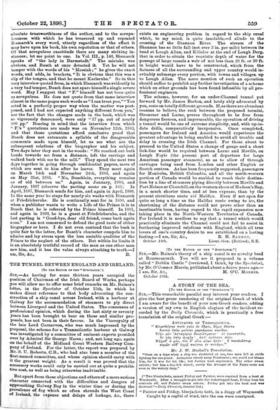The scheme, however, for an under-Channel tunnel put forward by
Mr. James Barton, and lately ably advocated by you, rests on totally different grounds. If, as there are abundant reasons to believe, the rock between the proposed termini, Stranraer and Larne, proves throughout to be free from dangerous fissures, and impermeable, the operation of driving a tunnel would be one of extreme simplicity, and, with up-to- date drills, comparatively inexpensive. Once completed, passengers for Ireland and America would experience the greatest advantage in being enabled to avoid all trouble and delay in crossing the Irish Channel. For those about to proceed to the United States a change of gauge and a short link-line would be required between Larne and Moville, on Lough Foyle (the present port of departure for large American passenger steamers), so as to allow of through carriages being used from London and other English or Scotch centres. As has been frequently suggested, passengers for Manitoba, British Columbia, and all the north-western portion of Canada would be enabled to reach their destina- tion by a line of steamers plying directly between Moville and Port Nelson or Churchill, on the western shore of Hudson's Bay, in a much shorter time, and at less expense, than by the present circuitous route viti Halifax. Even if not open for quite so long a time as the Halifax route owing to ice, the shortening of the distance could not prove other than an inestimable boon, having regard to the rapid expansion now taking place in the North-Western Territories of Canada. For Ireland it is needless to say that a tunnel which would practically eliminate the Channel could not fail to assist in furthering improved relations with England, which all tree lovers of one's country desire to see established on a lasting










































 Previous page
Previous page